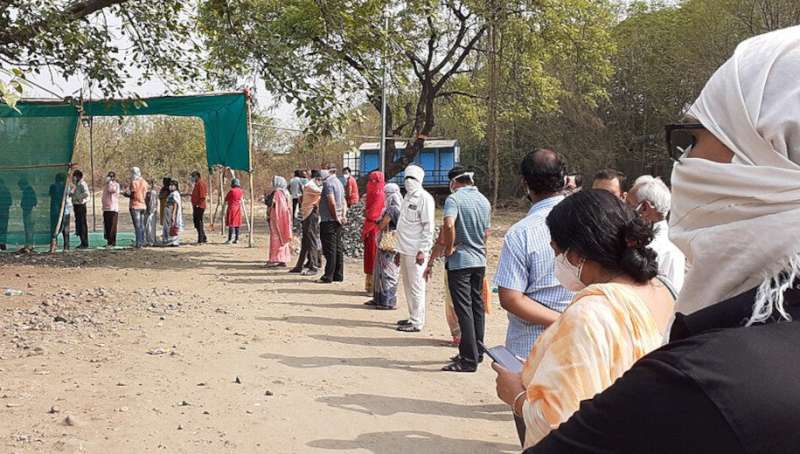
India must accelerate mass vaccinations to cope with the impending third wave of COVID-19, say experts.
As India braces for a third wave of COVID-19, experts recommend accelerated mass vaccinations along with improved testing methods and surveillance to avoid a repeat of the deadly second wave that hit the country in April to May.
K. VijayRaghavan, principal scientific adviser to the central government, maintains that given the high levels of circulating viruses a third wave is inevitable. “But, it is not clear on what time-scale this phase three will occur,” he told a media briefing.
A study released 5 July by the State Bank of India (SBI) indicated that a third wave may hit the country as early as mid-August. The bank’s research group says that “the third wave of the COVID-19 pandemic is likely to hit India by mid-August, while cases may peak in September.”
According to the SBI report, the peak of the third wave will see 1.7 times as many cases as occurred during the peak of the second wave in early May when more than 40,000 new cases were reported daily. Since then, there has been a steady decline in daily cases.
Soumya Kanti Ghosh, chief economic advisor to SBI, said at the launch of the report that by the third week of July average daily cases were expected to reduce to around 10,000, on current projections. “However, based on historical trends, cases can start rising again by the end of August with the peak of the third wave coming a month later, in September.”
Ghosh and other analysts agree that India’s best bet is to accelerate the pace of vaccination well beyond the current rate of four million doses daily. So far, according to the SBI report, only 4.6 percent of the population has been fully vaccinated.
India, a country of 1.4 billion people, must carry out 8—9 million vaccinations per day to cover all adults by the end of the year. Immunization picked up after 21 June when India began implementing a policy of providing free vaccinations to all citizens over 18, though the drive has been hampered by vaccine shortages.
Ramanan Laxminarayan, an epidemiologist and founder director of the Center for Disease Dynamics, Economics and Policy based in Washington, D.C., said at a webinar on 9 July that much depended on the leadership of the country. “If the leaders are careful, it [third wave] will not get out of control.”
To limit deaths during the expected third wave, those aged over 45 must be prioritized for vaccination, “since they are more likely to have comorbidities such as high blood sugar levels, blood pressure, respiratory disorders and be immunocompromised,” said Laxminarayan, who is also a senior research scholar at Princeton University and an affiliate professor at the University of Washington.
Varsha Sridhar, a molecular virologist and cofounder of the Bangalore-based Molecular Solutions Care Health LLP, told the same webinar that it was important to extend epidemiological surveillance beyond the Indian Council of Medical Research (ICMR) and associated government institutions and co-opt private entities into any effort to curb the third wave.
“Saliva testing kits for COVID-19 designed by Indian companies are yet to be sold as they have not been approved,” Sridhar said. “There is a need to make testing easier than the present method of taking nasal and throat swabs.”
According to Sridhar, epidemiological surveillance in preparation for the third wave should include sewage-based tracking, drug sales, drug levels in sewage, COVID-19 calls to government and private help lines, and calls made to physicians with private practices.
Sridhar also said there needed to be greater transparency in data availability and sharing with institutions outside the government. “As of now data from RT-PCR and other tests and vaccinations is not being made available to groups outside ICMR and related institutions.”
Jayanti Shastri, head of the state-run Kasturba Infectious Diseases Hospital’s Molecular Diagnostic Lab in Mumbai, says that a sero-survey it conducted among children suggested that a third wave will not affect children as widely feared. “We found adequate levels of antibodies in children and the third wave, if it comes, will not affect the pediatric population,” he told the webinar.
Meanwhile, a report published by the non-profit Social Science in Humanitarian Action Platform recommends increasing government expenditure on public health from the current 1.25 percent of GDP to a level that can strengthen the public health delivery system and achieve the stated goal of universal healthcare coverage.
According to the report, “lack of data transparency and science-informed decision-making has paved the way for the rapid spread of misinformation. Myths, conspiracy theories, unverified information and medical advice have led to anxiety and uncertainty.”
Source: Read Full Article